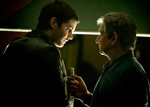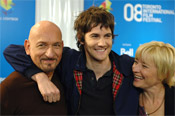| 27 April 2024 | The Irish Film & Television Network | |
 |
|
|
The film’s title ‘Fifty Dead Men Walking’ refers to the fifty men that Martin McGartland, played by Brit actor Jim Strugess (21, The Other Boyelyn Girl), is thought to have saved during the Troubles during the late 1980’s. McGartland was recruited by a British Special Branch Officer (Sir Ben Kingsley - Gandhi, Schindler’s List) to spy on the IRA and subsequently spoiled numerous murder plans against the British army. After being discovered, McGartland has since had to live his life on the run. The distinguished cast features supporting international talents; Kevin Zegers (Transamerica), Natalie Press (My Summer of Love), Rose McGowan (Grindhouse: Death Proof) as well as Irish actors Michael McElhatton (Spin the Bottle), Tom Collins (Closing the Ring), Nick Dunning (My Boy Jack) and Anthony Brophy (The Tudors). Produced by HandMade, Future Films and Canada's Brightlight Pictures with backing from Northern Ireland Screen and Telefilm Canada, the film was chosen to screen at the prestigious Toronto Film Festival last September and received its UK and Irish premiere at the recent Jameson Belfast Film Festival. In our IFTN interview, director Kari Skogland (The Stone Angel) chats about why the universal and personal message at the centre of the film takes full prominence over its political one. IFTN: Kari when did you first come into contact with Martin McGartland’s story? Kari: A couple of years ago, a friend bought me the book and because I was brought up in Canada, of course I was certainly aware of the Troubles but I didn’t have real inside knowledge. I was familiar with the territory but what I loved about the book was the voice of a young man growing up inside a conflict. It wasn’t a voice that I had heard before and I then was very curious about doing more research into the setting that he was in. But it was really the universal voice and story that I was attracted to, about a young man who was forced to make some very difficult choices with very extreme consequences and how that ultimately draws us back to the responsibilty of the individual within their community. KS: I absolutely loved shooting there. Belfast is a fantastic city and we really enjoyed it. I brought my family there, they went to school and my girls ended up with Irish accents which was a bonus! We had a great time and it’s said that it takes a village to make a movie, well it takes a city and in this case that city was Belfast. Everyone really opened their arms and welcomed us and made sure that I got it right, the candour and the honesty that everybody came to me with was absolutely spectacular. How long did you actually film there for? KS: I was there for close to six months. We were filming for a couple of those months but of course I had to do a lot of research, so living there was important to get all that done and the rewriting. It was an intense time but very, very rewarding as a film maker. KS: Well he and I discussed many things and certainly I had long conversations with him, but one of the things that was my job as film maker was that he had some very passionate perspectives and I wanted the film to not have a political agenda. It is not a political document and for the political context that we were in, it needed to be a very evenly told story. I had to be very careful with all of the people I used in my research, consultants and various things - that I wasn’t swayed by the passion that they brought to the table. KS: It is a different story if you are portraying someone in history that people know like say Tony Blair or The Queen because then you have to stay true to even the nuance or the look of the person. With this particular story, and don’t forget I was making it for an international audience - my responsibility as film maker was to bring the essence of what I thought was the unique voice of the underlying story. That was the story of responsibility to community through finding the moral guideposts, the ethics and the morals of the individual. This was the story that I was telling at the end of the day. It wasn’t a documentary on Martin McGartland. His story was the hanger on which I hung the coat, but when I was in Belfast doing research I realised there was a kind of larger story to tell and that was the story of someone going against community or operating in their mind for the community and what that was going to cost them. I wanted it to have a universal quality and the relevance of that story could happen in inner city, or it could happen in Iraq today, so I wanted to make sure that I was serving that much more character driven story and the personal drama versus the political drama. How did Jim Sturgess approach the role? KS: Jim is a teriffic actor and he was very diligent. First of all he embraced the role and it was a difficult one. From the moment he set foot on Irish soil he adopted the accent and we surrounded him with people who constantly tweeked it and got it right. He had a dialect coach from Belfast but would go to bars and talk to people just to have them correct him. It got to a point where we would go to a bar and people would ask him what street he was from... we then we knew we got it right! He was absolutely brillant. How did Sir Ben Kingsley become involved with the film? KS: He was one of the first actors who came on board. He read the role and again was very responsive. One of the things that is great about Sir Ben is that he is the master of nuance and this was a role that required him to play his cards very close to his chest. For him to come on board it really meant we were able to commit to it and have the fiancers come on board. It was really critical and I couldn’t have got luckier to have the two of them and how they interacted. There was a genuine fondness between them which you will seen screen. They were constant professionals and you know we had some very difficult days to achieve and they just came on board so willing, open and honest in their potrayel of these characters. |
||||||||||||||||||||||||||||||||||
Contact Us | Advertise | Copyright | Terms & Conditions | Security & Privacy | RSS Feed | Twitter
|
||||||||||||||||||||||||||||||||||



